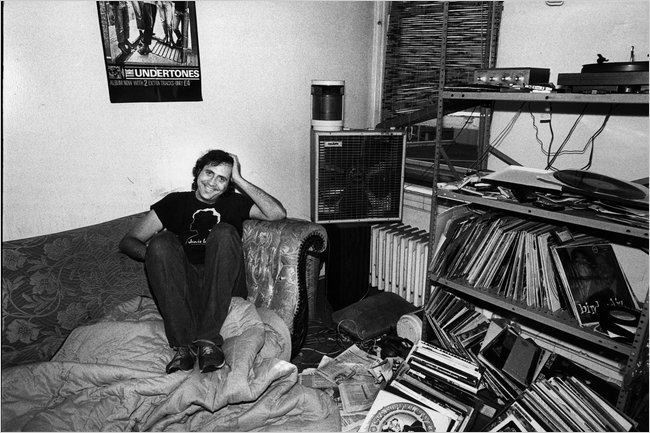
French version
(english below)

Assurément, découvrir la pensée de Lester Bangs a, à jamais, changé ma façon de percevoir non seulement la critique (toute critique d’art) mais également la musique. Je l’ai dit, Lester Bangs avait une obsession particulièrement pour les analyses sociologiques qui inondent ses critiques. Mais après tout, quoi de plus légitime à cela ? La musique est un formidable moyen pour évaluer nos sociétés. Parfois, et c’est ce qui lui est arrivé en interviewant les Clash, les artistes n’étaient pas près à ce que leur musique soit mise en perspective. Beaucoup d’artistes actuels rejettent également cela. C’est pourtant le rôle d’un critique, et personne mieux que Lester Bangs ne montre la voie. Alors bien sûr, certaines de ses critiques sont ainsi plus mythiques que les autres. Comment oublier celle écrite sur Van Morrison. Comment oublier celle sur Lou Reed où il retranscrit leurs dialogues dans un bar, évoquant la drogue et David Bowie (qu’il étripe à de nombreuses reprises, le décrivant comme un clown froid et calculateur). Comment oublier celle sur les Clash, probablement la plus légendaire de toute. Pour Lester Bangs, le punk, qu’il décrit comme étant l’ultime rock’n’roll (à noter, l’utilisation du mot “Punk” pour décrire un style musical est du fait de Lester), était avant tout un combat contre ce que la société impose : le fait que chaque individu agisse en conformité avec la façon dont la société attend de lui qu’il agisse.
——————————
Lester Bangs and thoughts on rock and critic
The purpose of this article is to spark debate. It is purposely jarring and may at times shock the sensibility of younger readers. But we should keep in mind that rock’n’roll lives through in our spirits. Debating the subject keeps it alive. This view is precisely what Lester Bangs avidly defends when declaring that The Clash was never just a manifestation of a movement that the public should carry. This article is also a pretext to explain to those who do not embrace rock’n’roll as a philosophy that they are missing out on something essential. In short, this paper is a work of passion, take it as it is.
Lester Bangs is one of the most recognised rock critics in history. He is one of the few that have given nobility to the words music critic. To read Lester helps one to understand what rock’n’roll is, and what a critic should be.
Above all else, it’s shocking just how great of a great writer Lester was. Loyal admirer of Kerouac, Ginsberg and Burroughs whom he often quotes, Lester’s writings are a sort of spoken language, Beat Generation coupled with Faulkner-ism. “I’m going to say it, and I’m going to say it slow”. But his biggest contribution is not simply his written word but the ideas his words embodied. The biggest portion of his work may was found on the pages of the legendary ‘Creem’ Magazine (“Americas Only Rock’n’Roll Magazine“). Others are scattered to the four corners of the earth, and today we must thank the editors that have taken the trouble to reassemble them into two new publications, Psychotic Reactions and Carburetor Dung (published in 1988) and Main Lines, Blood Feasts, and Bad Taste (2003). If the second is less focused on music reviews, while the former is a masterpiece of the genre. Each time I open it, I get the same butterflies as though I am listening to a new album for the first time. It might certainly be an unconscious process aimed at avoiding a complete submergence into the genre of the critic. It is also a process aimed at avoiding true reviews that, seeing as it is to the point, could shake up the reader’s ideas, pushing him to think for himself and question his most strongly held beliefs.
On this point, as well as many others, I agree with Lester that there are not enough critics. This opinion is also shared by Bret Easton Ellis, while denouncing the fact that negative reviews are not completely accepted in this “Like” society. Every time a negative review is published, its author is condemned as an elitist. Still in Rock is, in a certain way, contributes to this issue since I the only the music that choose to critique is music I know I like (a decision made primarily for logistic reasons, too many articles would be needed to review all the rubbish we are subjected to regularly). Even positive reviewers should remain honest and independent. Lester always upheld this independence. As the editor of Creem magazine, he sold the back cover to an advert for a Frank Zappa album and then published review in the same issue in which he destroying that very same album! This kind of scenario is inconceivable in the French written press from the late 2000s and 2010s; a scenario which I deplore. This is precisely why we lack critic(s).
Lester Bangs should be read for several reasons. He treats us to numerous musical discoveries. His “Reasonable Guide to Horrible Noise” is a terrific example. But we also read Lester Bangs to understand music, understand the art of reviewing, and to obtain the knowledge necessary to form our own opinions. Reading Lester also gives us the illusion that we can completely understand his way of thinking, even if, at the same time, we cannot help but realize that his spirit remains totally unpredictable. So I wonder. What would he have written about Nirvana, Pavement or Sonic Youth? How would he have praised them? (yes, I’m sure he would have). How can we bring Lester’s way of reviewing into 2014 without betraying him, but in keeping with the historical continuity of music?
We find in the writings of Lester a precise definition of what rock’n’roll is, which is I think the key to bringing back his way of thinking to the present day. There are few today who have tried to define rock music, and even fewer who have succeeded. Lester Bangs never hesitated to describe what rock’n’roll is, or should be – absurd, frivolous, care free and without seriousness. He was right. This is in fact what distinguishes rock music from any other. “Rock’n’roll is just a joke” he said, adding “I believe in rock’n’roll, but I don’t believe in Rock’n’Roll”. This line of thinking provides an explanation of why why electronic music is so awful, precisely because it takes itself too seriously. Equally, many rockers have forgotten this spirit as well, and the point is very clearly expressed in his critiques of The Clash; rock music is also a matter of authenticity. Bob Dylan “was fake”, The Clash ”were authentic”. Lou Reed “was authentic”, Jagger “was fake” (“too professional” he said, plus, “the Stones always tended to copy the riffs of Blues musician, or Chuck Berry”).
So, if for Lester Bangs rock was synonymous with authenticity and the absence of vanity, a line that many artists have difficulty toeing. Quite simply the true definition of rock. It is necessary for us to observe the current landscape, and ask ourselves who fits our criteria. We can certainly laugh at those who are most ironic, but are they authentic or do they simply play to fulfil the whims of whatever rock scene they are a part of? We can certainly respect certain groups who deeply believe in their creations, but should we consume and praise their work when they continue to despise their audience, the press, etc.? The response to these two questions is negative. Negative because Lester summarised what rock’n’roll is: authenticity that can step back and take a look at itself.
Occasionally, Lester brings up more serious subjects, although always with delicacy. As was the case when he began to speak about racism (look at his articles on The Clash or The White Noise Supremacists). His article on Lou Reed enabled him to portray the link between rock’n’roll and the decadence of its characters. In all, Lester Bangs was profoundly pessimistic, always declaring “nobody wants to have emotion anymore” to whoever would listen to him. We have to ask: even though he was certainly a pessimist, should we not recognise him for his sense of reality? When I see the electronic scene grow, I find myself agreeing with him (despite his cynicism): emotion is disappearing from music. We are suffering from the dehumanization of the musical art form!
We often come across his pessimism. “I don’t discriminate, I’m prejudiced against everybody” he said, citing Legs McNeil. Agains despite his cynical exterior Lester Bangs actually had idols, in the form of Lou Reed (he said that “the Velvet Underground were the greatest band that ever existed“), Iggy Pop (to whom he attributed the idea of bringing a sarcasm into rock music, take a look at his article on Iggy which is superb) and Elvis. The common point between these three artists is that they translate the attraction which Lester had for death. He had for instance repeatedly commented that the music of Lou Reed was anti-emotional, so much so that it actually was super emotional. Ditto for Iggy Pop who Lester felt to be unalive. Finally, I believe Lester’s thinking made perfect sense, he embraced the artists that expressed in themselves the simplest and most honest emotions. Yes, rock’n’roll is a business of sensations. Lester himself revealed the sensation of liberation of his first concerts, when we go home and we say to ourselves “nothing can cancel the reality of that night”.
Lester rarely entered into the technical elements of the album (he couldn’t stand the over priced recording equipment, because he thought that these things misrepresented the musical product, so it was logic for him not to take this into consideration). He said that he was usually more interested in the artist’s attitude than the music itself. He also had an historical appreciation of music, often mentioning important social movements. Therefore, we learn by reading Lester Bangs that rock’n’roll is not the generator of social revolutions, but, better than any other medium, it nourishes and accompanies them. However, Lester has often denounced the mixture between rock’n’roll and the ‘star system’. He said very clearly that he hated rock stars, especially because he found them to often be completely devoid of any personality. This is why he branded Joe Cocker and Robert Plant of Ledzep, as “blank” people that agents can model them into something sellable, something which they were not. It was finally when Lester focused his writing on a more analytical view that we find his best work.
Discovering the thoughts of Lester Bangs has changed my generally attitudes towards reviews in general, and music reviews in particular. As I mentioned, Lester Bangs had a particular obsession for sociological analysis, which pervade his reviews. But after all, what is more legitimate? Music is a formidable way in which we assess society and culture. Sometimes, and this is what happened to him while interviewing The Clash, artists wasn’t ready to have their music put into this kind of perspective. Many contemporary artists rejected it. This is however the role of a critic, and there is no one better than Lester to show us how a critic ought to behave. Of course, some of his reviews are more legendary than others. How could we forget the one he wrote about Van Morrison? How could we forget the one he wrote about Lou Reed which consists of their dialogue in a bar, talking about drugs and David Bowie (who is destroyed several times, describing him as a cold and calculating clown). How could we forget the one he wrote about The Clash, probably the most legendary of them all. For Lester Bangs, punk which is described as the ultimate rock’n’roll (note that the word “Punk” is now used to describe a musical style because of Lester), was, primarily, a fight against what society imposed: the fact that each individual acts in conformity with the way in which society expects them to act.
Many of his other reviews are unique and not focused on a particular movement or deeper analysis. This is the case of the 5.000 letters article published about Metal Machine Music where Lester Bangs “forgot” to explain the reason why he loved this album so much. This goes some way to reveal Lester Bangs approach to reviewing music. I believe that there are two clear points to his approach. Firstly, all reviews are necessarily subjective, and also that it does little to focus on critic’s conclusion about an album when it is the discovery and appreciate process that matter. Secondly, a review is a way to reveal and that a reviewer need not tell his readers how to judge a particular work. If it is an art, it is necessary to allow the readers to make their own opinions. It is the role of the artist to ensure he does not project a “white screen” without any message, as Lester had sometimes denounced.
Lester saw all the force of democracy in rock’n’roll. “You can do it too”. Power of the music for everyone. “Rock’n’roll is truly the democratic art form” he added. It was one of Lester‘s obsessions, but how many are they today still saying it, or even thinking it? Maybe, this is the point on which Lester failed, to make people understand that “elitism must perish“. “Openness and accessibility is much more revolutionary than all this elitism“. When I see today how the many in the music scene take themselves seriously, how even the worst bands believe they are revolutionary, I think of U2 & co (hello Arctic Monkeys and Black Keys collection 2013/2014). I think to myself that Lesters message needs, more than ever, to be told again and again. The Clash were a great band precisely because they had all the humility in the world (unlike Bryan Ferry, see Lester’s interview), they were not representative of the people, but they were the people. We should not totally lose hope, artists like Marc DeMarco still continue to fly the flag for rock’n’roll music with this detachment which is not faked. Yet, folks cut from this cloth are still so rare…
The difference between these groups and all the others rests also in their statements. The Sex Pistols and The Ramones (who mention Lester in one of their song “It’s Not My Place (In the 9 to 5 World)“, Hangin’ out with Lester Bangs you all) had something to say, the same for Television, but today so few groups have something real to say, except for “please make me rich and famous”. Altogether, Lester was seeking passion and a message. All the big names, the Doors, the Band, the Velvet, Patti, Bruce, The Sex Pistols and The Clash, all had a vision, a point of view on the world that was unique.
Lester said that rock’n’roll is “the most invincible Superjoke in history”, because we can’t enslave an idiot. But immortality should not mean that we do not spread his philosophy, continue to develop and to cherish it. It is surely time for his philosophy to be brought up to date. But for now, let’s part ways with one last thought from Lester Bangs “What is this fucking “M.T.V.”? Though for sure it was some new drug, but Rick says it’s not“.




Post a comment